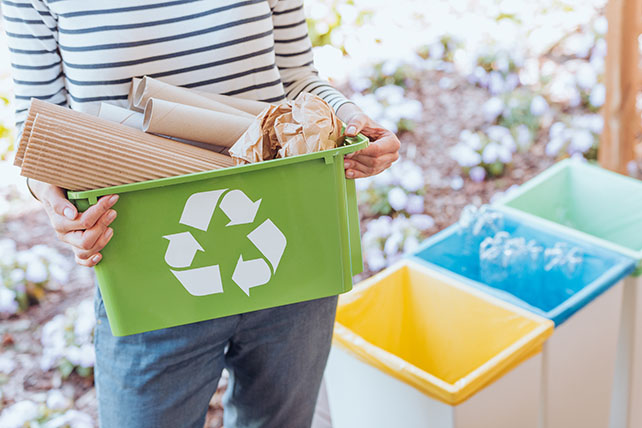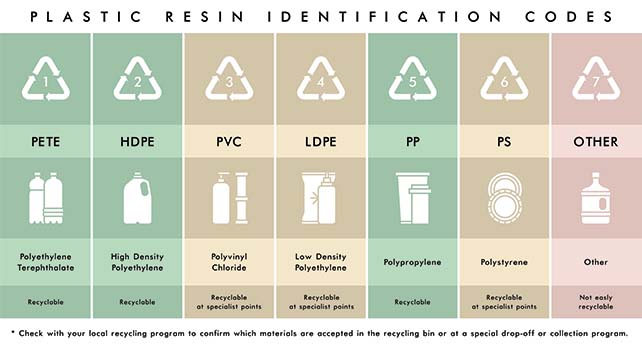
From 1950 to 2015, it is estimated that 8.3 billion tons of plastic have been produced worldwide. Shockingly, only 9% of that has ever been recycled. – Science Advances. These figures have continued to grow in the years after 2015, and now we face a climate emergency.
We are all trying our best to be more conscious about the packaging of the products we buy and how to recycle them. 67% of us consider it important that the products we buy should be in recyclable packaging. The manufacturers provide us with helpful symbols, so we know what to do with packaging when choosing which bin to place it in…easy, right? In real terms, this isn’t the case.
So why it is so hard? What do these symbols even mean?
Recycling hieroglyphic translations
 Recycle – This label indicates that the packaging is eligible for collection by 75% of local authorities across the UK.
Recycle – This label indicates that the packaging is eligible for collection by 75% of local authorities across the UK.
 Recycle/Rise – Rinsing packaging ensures that any food residue will not contaminate other materials. This is particularly important in mixed recyclable collections. Residue from food containers can destroy the fibres in paper and cardboard.
Recycle/Rise – Rinsing packaging ensures that any food residue will not contaminate other materials. This is particularly important in mixed recyclable collections. Residue from food containers can destroy the fibres in paper and cardboard.
 Don’t Recycle/Sleeve – This label indicates packaging where components of it are not recyclable. Instructions on the label will highlight which elements to exclude from your recycling, e.g., remove sleeve.
Don’t Recycle/Sleeve – This label indicates packaging where components of it are not recyclable. Instructions on the label will highlight which elements to exclude from your recycling, e.g., remove sleeve.
Other Labels
 The Green Dot – This label does not mean that the packaging is recyclable. This symbol is used in some European countries to signal that the product's producer has made a financial contribution towards the recovery and recycling of the packaging within Europe.
The Green Dot – This label does not mean that the packaging is recyclable. This symbol is used in some European countries to signal that the product's producer has made a financial contribution towards the recovery and recycling of the packaging within Europe.

Mobius Loop – Indicates that an object is capable of being recyclable. However, local authorities may not it accept as part of your weekly collection. So it is worth checking if your local recycling centre will take it.
Plastic Resign Codes – This is where it gets confusing, as all packing with this label is potentially recyclable. However, not all codes are accepted by local authorities or recycling centres.

 Glass – This label is only found on glass products. Its purpose is to remind consumers to dispose of their glass products at a local bottle bank. (Unless stated otherwise).
Glass – This label is only found on glass products. Its purpose is to remind consumers to dispose of their glass products at a local bottle bank. (Unless stated otherwise).
 Aluminium – This symbol indicates the packaging is constructed from recycled aluminium. Aluminium can also be endlessly recycled with minimal effort.
Aluminium – This symbol indicates the packaging is constructed from recycled aluminium. Aluminium can also be endlessly recycled with minimal effort.
 Tidyman – A symbol from ‘Keep Britain Clean’. Its purpose is to encourage consumers to dispose of their products as indicated. This label does not relate to recycling.
Tidyman – A symbol from ‘Keep Britain Clean’. Its purpose is to encourage consumers to dispose of their products as indicated. This label does not relate to recycling.
 Waste Electrics - This symbol can be found on electrical products and indicated it cannot go into general waste. However, electrical items can be recycled through several channels. It is worth checking with your local council.
Waste Electrics - This symbol can be found on electrical products and indicated it cannot go into general waste. However, electrical items can be recycled through several channels. It is worth checking with your local council.
 Compostable – Products certified with this label can, be industrially composted. Do not put products with this label in the recycling. Instead, put compostable products in your local authority garden waste.
Compostable – Products certified with this label can, be industrially composted. Do not put products with this label in the recycling. Instead, put compostable products in your local authority garden waste.
FSC (Forest Stewardship Council) – This certified label can  be found on wood-based (paper/cardboard) packaging made from forests that are independently certified and operated to FSC responsible sources rules. This label alone does not mean the product is recyclable.
be found on wood-based (paper/cardboard) packaging made from forests that are independently certified and operated to FSC responsible sources rules. This label alone does not mean the product is recyclable.

PLASTIC FREE – A symbol from the environmental group 'A Plastic Planet'. Products with this symbol are 100% plastic-free. This symbol alone does not indicate that the product is recyclable. However, it is a good indicator it might be.
All of our cards are certified Plastic Free and FSC approved. All of our products are 100% recyclable and harmless to the environment.
Plastic is still plastic
You have carefully sorted your recycling, left it out for collection… and then what?
In recent years horror stories from around the world of Plastic collected as recycling from the UK, and other countries are being shipped to poorer countries to be dumped in landfills. The UK exported 7,133 metric tonnes of waste to poorer countries in Sept 2020 alone.
Luke Pollard, Shadow Secretary of State for the Environment, Food and Rural Affairs said,
“The British people expect to see these exports banned, more recycling of materials at home and faster action on the climate crisis. It is up to ministers to deliver on their promises fast, but this doesn’t look good”
A BBC investigation based in Turkey in March 2020 found that although Plastic had been carefully sorted and separated by UK households. In reality, our recyclable plastic rubbish is being shipped to Turkey to be dumped and incinerated, releasing tones of poisonous chemicals into the atmosphere.
The UK sends over 200,000 tonnes of Plastic to Turkey every year. In 2020 Britain received 22 repatriations requests from 7 countries to take back our plastic exports. Turkey (although briefly) was part of a growing list that has banned the UK from exporting plastic waste to their countries.
Simon Ellin, CEO of The Recycling Association said,
“In the UK we export about 70% of the plastic we collect because we don’t have the processing capacity to handle it,”
As you can imagine, this is unsustainable.
Our mission as Green Gift Cards is to take the plastic out of the card industry. Our cards are 100% plastic-free and sustainably sourced. We are proudly certified by PLASTIC-FREE and FSC.
If you are interested in changing to eco 100% plastic-free, recyclable gift. Loyalty, membership and ID cards, please contact our team today. Switching to Green Gift Cards is the easiest, hassle-free business choice you can ever make.



 Recycle – This label indicates that the packaging is eligible for collection by 75% of local authorities across the UK.
Recycle – This label indicates that the packaging is eligible for collection by 75% of local authorities across the UK. Recycle/Rise – Rinsing packaging ensures that any food residue will not contaminate other materials. This is particularly important in mixed recyclable collections. Residue from food containers can destroy the fibres in paper and cardboard.
Recycle/Rise – Rinsing packaging ensures that any food residue will not contaminate other materials. This is particularly important in mixed recyclable collections. Residue from food containers can destroy the fibres in paper and cardboard. Don’t Recycle/Sleeve – This label indicates packaging where components of it are not recyclable. Instructions on the label will highlight which elements to exclude from your recycling, e.g., remove sleeve.
Don’t Recycle/Sleeve – This label indicates packaging where components of it are not recyclable. Instructions on the label will highlight which elements to exclude from your recycling, e.g., remove sleeve. The Green Dot – This label does not mean that the packaging is recyclable. This symbol is used in some European countries to signal that the product's producer has made a financial contribution towards the recovery and recycling of the packaging within Europe.
The Green Dot – This label does not mean that the packaging is recyclable. This symbol is used in some European countries to signal that the product's producer has made a financial contribution towards the recovery and recycling of the packaging within Europe.

 Glass – This label is only found on glass products. Its purpose is to remind consumers to dispose of their glass products at a local bottle bank. (Unless stated otherwise).
Glass – This label is only found on glass products. Its purpose is to remind consumers to dispose of their glass products at a local bottle bank. (Unless stated otherwise). Aluminium – This symbol indicates the packaging is constructed from recycled aluminium. Aluminium can also be endlessly recycled with minimal effort.
Aluminium – This symbol indicates the packaging is constructed from recycled aluminium. Aluminium can also be endlessly recycled with minimal effort. Tidyman – A symbol from ‘Keep Britain Clean’. Its purpose is to encourage consumers to dispose of their products as indicated. This label does not relate to recycling.
Tidyman – A symbol from ‘Keep Britain Clean’. Its purpose is to encourage consumers to dispose of their products as indicated. This label does not relate to recycling. Waste Electrics - This symbol can be found on electrical products and indicated it cannot go into general waste. However, electrical items can be recycled through several channels. It is worth checking with your local council.
Waste Electrics - This symbol can be found on electrical products and indicated it cannot go into general waste. However, electrical items can be recycled through several channels. It is worth checking with your local council. Compostable – Products certified with this label can, be industrially composted. Do not put products with this label in the recycling. Instead, put compostable products in your local authority garden waste.
Compostable – Products certified with this label can, be industrially composted. Do not put products with this label in the recycling. Instead, put compostable products in your local authority garden waste. be found on wood-based (paper/cardboard) packaging made from forests that are independently certified and operated to FSC responsible sources rules. This label alone does not mean the product is recyclable.
be found on wood-based (paper/cardboard) packaging made from forests that are independently certified and operated to FSC responsible sources rules. This label alone does not mean the product is recyclable.

